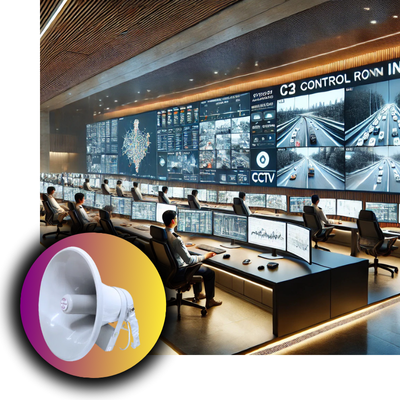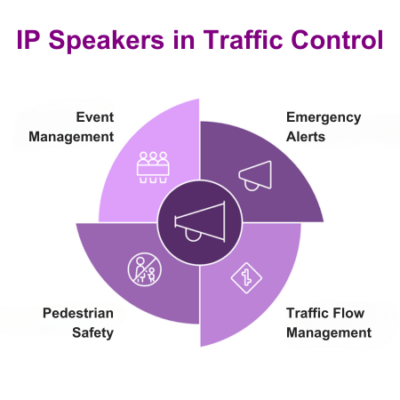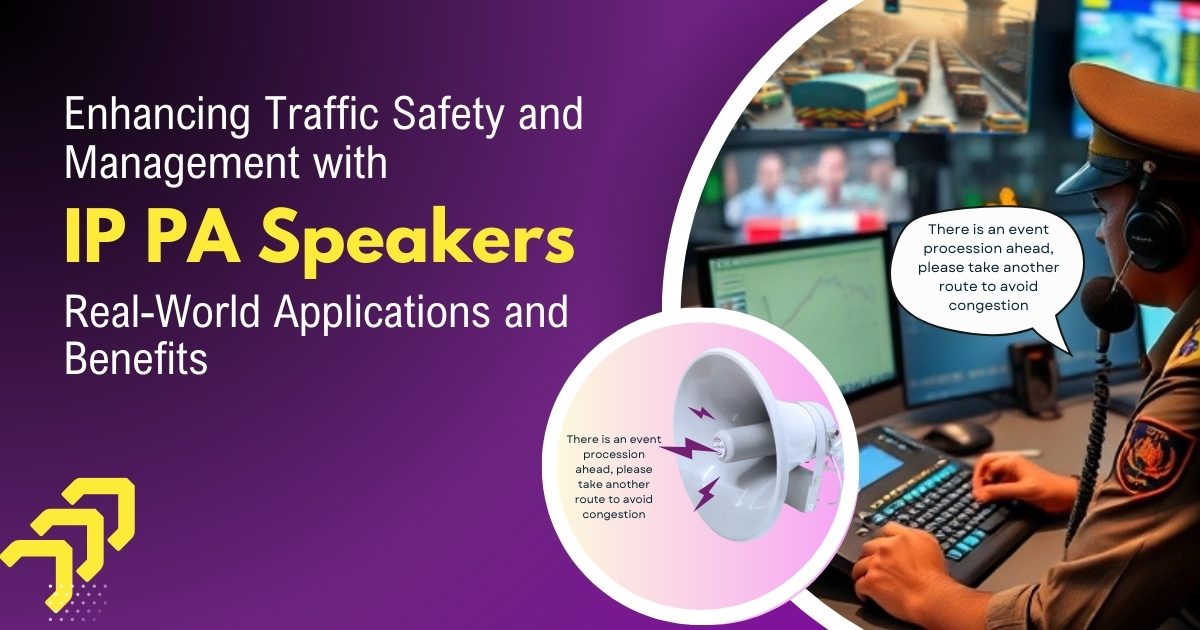Why IP Speakers are Essential for Traffic Controls
Modern cities are rapidly adopting advanced technologies to streamline traffic management and enhance public safety. Centralized traffic control systems, equipped with IP-based cameras and traffic light controls, have become the backbone of urban traffic management. However, the addition of IP-based speakers to these systems is proving to be a game-changer, providing traffic control rooms with the ability to make real-time announcements and effectively manage emergencies.
Enhancing Control Room Capabilities
A centralized traffic control room serves as the nerve center for monitoring and managing traffic across multiple junctions. While cameras provide visual insights and traffic light systems ensure smooth vehicle flow, the integration of IP speakers adds a vital auditory dimension.

Control room operators can observe incidents in real-time and instantly broadcast messages to manage situations such as accidents, traffic violations, or unexpected roadblocks.
For example, in the event of an accident causing congestion, the control room can use IP speakers to guide drivers toward alternative routes or inform pedestrians to stay clear of a hazardous area. This immediate communication capability significantly enhances the control room’s ability to maintain order and ensure public safety.
In case of speakers, two technologies come into picture: Old Analog Speakers and Modern IP based Speakers. A closer examination of the technology reveals that IP based speakers are most suitable for this application scenario. The limitations of analog technology and advantages of IP speakers are provided below.
Limitations of Analog-Based Speakers
Traditional analog-based speaker systems require extensive cabling to connect the control room to individual traffic junctions. This infrastructure comes with significant drawbacks:
1. High Installation Costs: Analog systems necessitate laying dedicated cables over long distances, leading to substantial labor and material expenses. This makes analog systems less feasible for cities with extensive traffic networks.
2. Vulnerability to Cable Damage: Analog systems are highly susceptible to disruptions caused by cable damage. If a cable is cut or damaged at any point, the speaker system becomes non-functional until repairs are made, leaving traffic controllers unable to communicate during critical situations.
3. Quality Degradation Over Distance: The sound quality of analog speakers diminishes as the cable length increases, resulting in poor audio clarity, especially in large cities with widely spaced traffic junctions.
Advantages of IP-Based Speakers
IP speakers, on the other hand, leverage modern networking technology to overcome the limitations of analog systems. Here are the key advantages of IP-based speakers in traffic control applications:
1. Cost-Effective Deployment: IP speakers can operate over existing fiber-optic networks, eliminating the need for dedicated cabling. Cities that already have robust communication infrastructure can integrate IP speakers with minimal additional investment, making them a cost-effective solution.
2. Superior Stability and Redundancy: IP systems are designed with built-in redundancy, often supported by multiple network providers. If one network connection fails, the system can seamlessly switch to another, ensuring uninterrupted functionality. In contrast, analog systems lack such redundancy, rendering them unreliable in the face of cable damage.
3. Consistent Audio Quality: Unlike analog systems, the performance of IP speakers is not affected by the distance between the control room and the traffic junction. Digital signals transmitted over IP networks maintain high audio clarity regardless of the network’s physical span.
4. Scalability and Flexibility: IP-based systems are highly scalable, allowing cities to expand their traffic management networks easily. New IP speakers can be added to the network without significant infrastructure modifications. Additionally, these systems are compatible with various digital communication protocols, enabling integration with other smart city technologies.
5. Remote Management and Control: IP speakers can be monitored and controlled remotely via software interfaces, providing traffic operators with a user-friendly way to manage announcements and diagnose system issues. This capability reduces maintenance time and ensures optimal system performance.
Practical Applications of IP Speakers in Traffic Control
The real-world applications of IP speakers in traffic management are numerous and impactful. Some notable examples include:

- Emergency Alerts: During emergencies such as fires, chemical spills, or natural disasters, IP speakers can broadcast evacuation instructions or safety measures to people in affected areas.
- Traffic Flow Management: In cases of heavy congestion or road closures, operators can provide real-time updates and detour information to drivers.
- Pedestrian Safety: IP speakers can be used to warn pedestrians about approaching vehicles at busy intersections or when crossing signals are malfunctioning.
- Event Management: During public events or parades, traffic control centers can coordinate crowd movement and vehicle diversions effectively using IP speakers.
A Future-Proof Solution
As cities continue to grow and urban infrastructure becomes more complex, the demand for reliable, scalable, and efficient traffic management solutions will only increase. IP speakers offer a future-proof alternative to traditional analog systems, aligning with the broader trend of smart city development. Their integration with centralized control systems not only enhances operational efficiency but also contributes to safer and more organized urban environments.
In conclusion, IP-based speakers are a critical component of modern traffic control systems. Their advantages in cost, reliability, audio quality, and scalability make them an indispensable tool for traffic management authorities. By adopting IP technology, cities can ensure their traffic control infrastructure is robust, adaptable, and prepared to meet the challenges of the future.




Leave A Comment